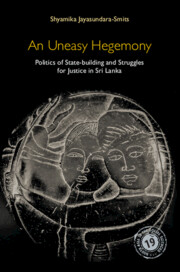Book contents
- Frontmatter
- Dedication
- Contents
- List of Tables and Figure
- Preface
- Acknowledgements
- List of Abbreviations
- 1 Introduction
- 2 Politics of Judgement
- 3 From Nationalism to Ethnic Supremacy
- 4 Political Patronage: Underbelly of Everyday Politics
- 5 State Institutions and Patronage Politics
- 6 War and Peace as Politics by Other Means
- 7 What Came after War?
- Afterword
- Appendix 1 Map of Sri Lanka
- Appendix 2 Indication of Background of Key Interviewees (from January to May 2009)
- Bibliography
- Index
7 - What Came after War?
Published online by Cambridge University Press: 29 July 2022
- Frontmatter
- Dedication
- Contents
- List of Tables and Figure
- Preface
- Acknowledgements
- List of Abbreviations
- 1 Introduction
- 2 Politics of Judgement
- 3 From Nationalism to Ethnic Supremacy
- 4 Political Patronage: Underbelly of Everyday Politics
- 5 State Institutions and Patronage Politics
- 6 War and Peace as Politics by Other Means
- 7 What Came after War?
- Afterword
- Appendix 1 Map of Sri Lanka
- Appendix 2 Indication of Background of Key Interviewees (from January to May 2009)
- Bibliography
- Index
Summary
In the previous chapter, I argued that the Sinhalese ruling political elites’ pursuit of war and peace was politics by other means and the numerous elite-invented discourses of war and peace served as an important hegemony-building strategy with the Sinhalese masses. One Marxist parliamentarian I interviewed on the verge of the announcement of the military defeat of the Liberation Tigers of Tamil Eelam (LTTE) observed that at that time ‘in general the Sinhalese are happy about the LTTE defeat’ (R.13). However, another respondent with no open political party association noted at the time of the interview during the last days of war in May 2009 that ‘today, people like war, they focus on a set of selected events’ (R.11). In the words of an academic with United National Party (UNP) affiliation, ‘in 2003, there was a muted sense of security, under that context people supported peace. But today in the context of heightened security the same people support war’ (R.18). Contrary to popular belief, immediate political developments in post-war Sri Lanka suggest that military defeat of the LTTE was not enough to complete the elites’ hegemony-building project. One foreign journalist noted,
A number of factors helped sweep him [Rajapakse] to re-election victory on Tuesday: his fiery rhetoric and sure popular touch; his emphasis on his role in last year's war victory; and ordinary people's sense that their streets are simply safer than they have been for the past 30 years because of the defeat of the Tamil Tigers. (Charles Haviland, BBC News, 29 January 2010)
Various dynamics in post-war high politics and state-in-society relations meant that ruling elites holding on to state power needed to invent new alliance-building and hegemony-building strategies, beyond manipulative tactics associated with Sinhala-Buddhist nationalist rhetoric. This was mainly due to their limited capacity to offer most Sri Lankans the hope of overcoming material economic struggles given the serious structural problems in the economy (IPS 2011: 15). The entrenched war economy remained one of the few sectors still growing after the end of the war (Jayasundara-Smits 2018: 4). The removal of the LTTE as an anti-hegemonic political force, the arch-rival of Sinhala-Buddhist hegemony, meant that they could no longer be blamed for the country's deepening economic woes.
- Type
- Chapter
- Information
- An Uneasy HegemonyPolitics of State-building and Struggles for Justice in Sri Lanka, pp. 275 - 300Publisher: Cambridge University PressPrint publication year: 2022

